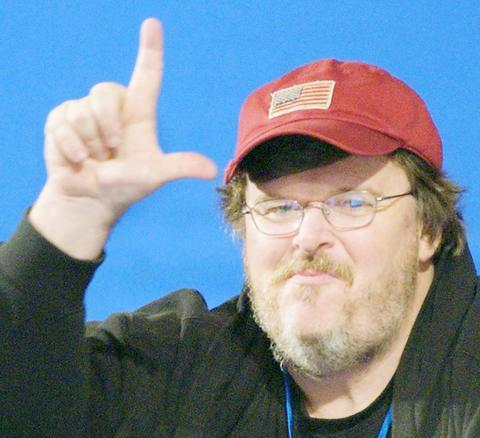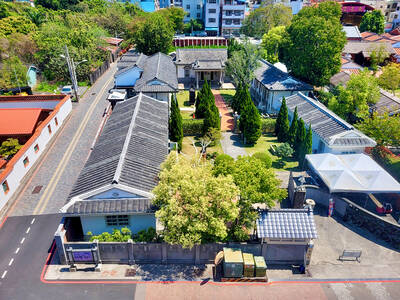They may not be looking like New York did last week, but in this hotly contested election year, movie multiplexes are becoming more and more politicized.
Not that it hasn't happened before. The Depression-era woes of the 1930s and the counter-culture movement of the late 1960s and early 1970s gave rise to a number of political-minded films -- from populist works like The Grapes of Wrath and Mr. Smith Goes to Washington to anti-authoritarian movies like Easy Rider and even One Flew Over the Cuckoo's Nest.

PHOTO: AP
As for the current spate of films, "It's something that was inevitable," says writer-director John Sayles, whose election-themed drama Silver City opens next week in the US. "People who make movies react to what's out in the world. And I think the politics in this electoral cycle have gotten pretty extreme."
Those reactions were evident all summer -- you know, what was supposed to be the escapist movie season. We saw references by the truckload to current events in The Manchurian Candidate remake ... and to gay Republicans in the updated Stepford Wives. The Day After Tomorrow boasted a Dick Cheney clone, not to mention a real-life attempt to build a green movement around a dubiously plotted disaster movie.
The Village's allegorical implications of how far Americans will go to shield themselves from fear were more disturbing than Shyamalan's traditional scare tactics. Perhaps even more frightening was Spike Lee's effort to cram every hot-button issue this side of Iraq into his sex farce She Hate Me. And if you ask him, Matt Damon will tell you that The Bourne Supremacy wasn't just an espionage thriller; it made a metaphorical point about how America should behave itself (not the way that it is), in the post 9-11 world.
Of course, Fahrenheit 9/11, Michael Moore's blistering attack on George W. Bush's administration and the Iraq War, was the ground-shaking phenomenon. Having grossed more than US$117 million, nearly six times the amount of any previous non-concert documentary, "F9/11" boosted a trickle of left-leaning nonfiction films (Control Room, Super Size Me) into a small theatrical flood (Orwell Rolls in His Grave, The Corporation, The Hunting of the President, Outfoxed, Uncovered, Bush's Brain).
And there are more to come. On the doc front, The Yes Men, about a troupe of pranksters who impersonate World Trade Organization operatives, opens later this month, and the survey of the gay marriage issue Tying the Knot arrives on Oct. 1, followed by Howard Zinn: You Can't be Neutral on a Moving Train and Going Upriver: The Long War of John Kerry. The September Tapes, a kind of Blair Witch-style hybrid about bounty hunters in Afghanistan, hits theaters Sept. 24.
Further down the fiction scale, Silver City, Sayles' look at a Colorado gubernatorial race, features Chris Cooper as a conservative candidate closely modeled on the inarticulate image of George W. Bush. Next month, we'll see the wackiest -- and perhaps most incendiary -- political movie of all: Team America: World Police from South Park bomb-throwers Trey Parker and Matt Stone, in which a squad of animated marionettes take on all sides in the war against terror.
All this after a long period in which Hollywood gingerly avoided mixing politics and entertainment (even Oliver Stone hasn't made a directly political fiction feature since his 1995 flop Nixon), and in which partisan documentaries not made by Moore rarely enjoyed commercial theatrical distribution.

April 28 to May 4 During the Japanese colonial era, a city’s “first” high school typically served Japanese students, while Taiwanese attended the “second” high school. Only in Taichung was this reversed. That’s because when Taichung First High School opened its doors on May 1, 1915 to serve Taiwanese students who were previously barred from secondary education, it was the only high school in town. Former principal Hideo Azukisawa threatened to quit when the government in 1922 attempted to transfer the “first” designation to a new local high school for Japanese students, leading to this unusual situation. Prior to the Taichung First

Chinese Nationalist Party (KMT) Chairman Eric Chu (朱立倫) hatched a bold plan to charge forward and seize the initiative when he held a protest in front of the Taipei City Prosecutors’ Office. Though risky, because illegal, its success would help tackle at least six problems facing both himself and the KMT. What he did not see coming was Taipei Mayor Chiang Wan-an (將萬安) tripping him up out of the gate. In spite of Chu being the most consequential and successful KMT chairman since the early 2010s — arguably saving the party from financial ruin and restoring its electoral viability —

The Ministry of Education last month proposed a nationwide ban on mobile devices in schools, aiming to curb concerns over student phone addiction. Under the revised regulation, which will take effect in August, teachers and schools will be required to collect mobile devices — including phones, laptops and wearables devices — for safekeeping during school hours, unless they are being used for educational purposes. For Chang Fong-ching (張鳳琴), the ban will have a positive impact. “It’s a good move,” says the professor in the department of

Toward the outside edge of Taichung City, in Wufeng District (霧峰去), sits a sprawling collection of single-story buildings with tiled roofs belonging to the Wufeng Lin (霧峰林家) family, who rose to prominence through success in military, commercial, and artistic endeavors in the 19th century. Most of these buildings have brick walls and tiled roofs in the traditional reddish-brown color, but in the middle is one incongruous property with bright white walls and a black tiled roof: Yipu Garden (頤圃). Purists may scoff at the Japanese-style exterior and its radical departure from the Fujianese architectural style of the surrounding buildings. However, the property